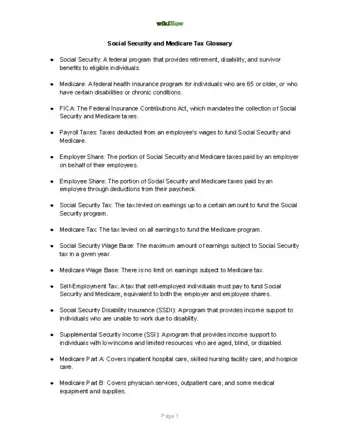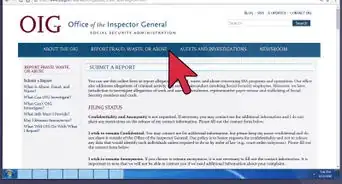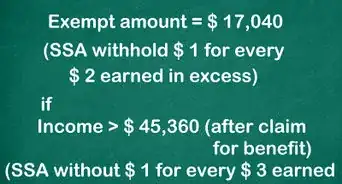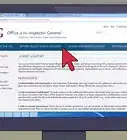This article was co-authored by Darron Kendrick, CPA, MA. Darron Kendrick is an Adjunct Professor of Accounting and Law at the University of North Georgia. He received his Masters degree in tax law from the Thomas Jefferson School of Law in 2012, and his CPA from the Alabama State Board of Public Accountancy in 1984.
This article has been viewed 39,959 times.
Most people working in the United States are required to pay Social Security and Medicare taxes. If you earn wages from an employer, these are called Federal Insurance Contributions Act (FICA) taxes, and they are split 50/50 between the two of you. If you are self-employed, according to the Self-Employment Contributions Act (SECA), you must pay the full amount of these taxes yourself. When completing your yearly income taxes, you will need to complete additional forms (Schedule C or F and Schedule SE) in order to calculate the amount of tax you owe and to pay the IRS.
Steps
Calculating Your Tax Amount
-
1Determine the amount of your income subject to Social Security and Medicare taxes. If you are paying Social Security (SS) and Medicare taxes on your own, it is most likely because you are self-employed. To calculate your tax, you must first add up all of the income you earned. However, exclude:[1]
- Income that has already had SS and Medicare taxes taken out (if you have a combination of self-employment income and wages earned from an employer)
- Dividends from stocks and interest on bonds held as an individual
- Interest earned from personal loans
- Money earned from renting real estate (unless that is your business)
- Income from a limited partnership
-
2Calculate the amount you owe in Social Security taxes. Currently, Social Security taxes amount to 12.4 percent of your income. If you work with an employer, this amount is split 50/50 (you pay 6.2 percent, and your employer pays the other 6.2 percent). If you are self-employed, you need to calculate 12.4 percent of your income and pay this amount yourself.[2]
- For example, if your self employment income is $50,000, you will need to pay SS taxes of $6200 (12.4% of $50,000).
- However, Social Security has a maximum taxable wage of $127,200. If your income is over that amount, you will only pay SS tax on the first $127,200.
- For instance, if your self-employment income is $150,000, you will only pay $15,772.80 (12.4% of $127,200) in SS taxes. The remaining $22,800 of your income above the $127,200 threshold will not be subject to SS taxes.
Advertisement -
3Calculate the amount you owe for Medicare. Taxes for Medicare are currently set at 2.9 percent of your income. If you receive wages from an employer, this is split 50/50, and each of you pays 1.45 percent of the total tax. If you are self-employed, you must pay the full amount yourself.[3]
- For instance, if your self-employment income is $50,000, you will pay Medicare taxes of $1450 (2.9% of $50,000).
-
4Add an additional Medicare tax amount on higher incomes. Unlike with Social Security, all income is subject to Medicare taxes. Furthermore, you must pay an additional 2.9 percent Medicare tax on any income you earn over a certain amount.[4]
- The threshold for the additional Medicare tax varies based on how you file. It is $200,000 if you file as single, head of household (with qualified person), or qualifying widow(er) with dependent child. It is $125,000 if you file as married filing separate. It is $250,000 if you file as married filing jointly.
- For instance, if you file as single and your self-employment income is $250,000, you must pay 2.9% in Medicare taxes on the first $200,000 of it, and 3.8% (2.9% + 0.9%) on the remaining $50,000. This means that your Medicare taxes would total $7700 ($5800 + $1900).
- If you earn wages over $200,000 from an employer, you must pay the full amount of the additional Medicare tax yourself. It is not split 50/50.
-
5Pay both FICA and SECA Social Security taxes, if necessary. If you have both wages from an employer and income from self-employment, Social Security taxes are paid on your wages first, but only if your total income is more than $127,200. This means that you may or may not need to pay SS taxes on all of your wages and income. For instance:[5]
- If you earned $45,000 from wages and $35,000 from self-employment, your employer will take out Social Security taxes on your wages. You will need to pay the taxes on your self-employment income. All of your wages and income will be subject to SS taxes because they total less than $127,200.
- If you have $100,000 from wages and $50,000 from self-employment income, your employer will take out Social Security taxes on your wages. However, only the first $27,200 of your self-employment income will be subject to SECA SS taxes. This is because your wages ($100,000) plus a portion of your self-employment income ($27,200) total the $127,200 threshold on SS taxes. The remaining $22,800 of your self-employment income will not be subject to SS taxes.
-
6Avoid filing if you are part of an exempt group. Most people who work in the United States are subject to Social Security and Medicare taxes. There are certain exemptions, but you may need to file additional paperwork with the IRS to claim this exemption.[6]
- Certain recognized religious groups opposed to Social Security and Medicare can apply for the exemption by filling out IRS Form 4029.
- Receiving this exemption also means you waive any benefits from these programs. If you were ever eligible to receive these benefits (regardless of whether or not you actually received any), you cannot apply for the exemption.
- Non-resident aliens must pay SS taxes unless they are students or educational professions working in the US on a temporary basis, or unless they are working for a foreign government.
- Students working for the same school they are enrolled at do not have to pay the FICA tax if their job is one they can only have because they are a student. In addition, this exemption only applies to wages earned from the school, not to any additional jobs.
Paying Your Taxes
-
1Work with an accountant or tax professional. Tax laws are subject to change, and can be complex. Talk to an accountant or tax professional if you want or need help calculating the taxes that you owe, or figuring out how to pay them. This is especially true if your tax situation is complicated (for example, you have both wages and self-employment income, or you are claiming certain exemptions).
-
2Fill out the required IRS forms. Actually paying your Social Security and Medicare taxes involves completing a couple of forms along with your IRS Form 1040 (your income tax form). File Schedule C (Profit or Loss from a Business) as well as Schedule SE (Self-Employment Tax). All of these forms are available from the IRS's website, and include instructions for filling them out.[7]
- If you use tax-preparation software to complete your taxes, these forms should be included. The software will guide you through filling out the forms.
- If you are self-employed in agriculture, file Schedule F (Profit or Loss from Farming) instead of Schedule C.
- File these forms even if you don't owe any income tax, so that you can pay your Social Security taxes. This increases your eligibility to receive SS benefits later.
-
3Take the allowable tax deductions. While you must pay the full amount of Social Security and Medicare taxes if you are self-employed, you can also claim a few tax deductions to lessen the blow. Follow the instructions included with your IRS forms, or the prompts given by your tax preparation software, in order to claim these deductions.[8]
- Your net earnings from self-employment are reduced by half the amount of Social Security tax you owe. This replaces the portion that your employer would have paid, which is not treated as taxable income.
- You can also deduct half of your Social Security tax on Form 1040. However, this deduction must be taken from your gross income, it cannot be itemized, and it cannot be on Schedule C.
-
4Pay any tax remaining. The amount you owe in Social Security and Medicare taxes equals the standard tax percentages of your income minus any deductions you are eligible for. If any amount remains, you must pay the IRS electronically (if you are filing online) or by sending a check to the address included on Form 1040.
Social Security and Medicare Tax Glossary
Expert Q&A
-
QuestionDo you have to pay Social Security tax if you are self-employed?
 Darron Kendrick, CPA, MADarron Kendrick is an Adjunct Professor of Accounting and Law at the University of North Georgia. He received his Masters degree in tax law from the Thomas Jefferson School of Law in 2012, and his CPA from the Alabama State Board of Public Accountancy in 1984.
Darron Kendrick, CPA, MADarron Kendrick is an Adjunct Professor of Accounting and Law at the University of North Georgia. He received his Masters degree in tax law from the Thomas Jefferson School of Law in 2012, and his CPA from the Alabama State Board of Public Accountancy in 1984.
Financial Advisor Yes. This is the tax on earnings from self-employment and is assessed against the net income of your business.
Yes. This is the tax on earnings from self-employment and is assessed against the net income of your business. -
QuestionWhat is the FICA rate for 2018?
 Darron Kendrick, CPA, MADarron Kendrick is an Adjunct Professor of Accounting and Law at the University of North Georgia. He received his Masters degree in tax law from the Thomas Jefferson School of Law in 2012, and his CPA from the Alabama State Board of Public Accountancy in 1984.
Darron Kendrick, CPA, MADarron Kendrick is an Adjunct Professor of Accounting and Law at the University of North Georgia. He received his Masters degree in tax law from the Thomas Jefferson School of Law in 2012, and his CPA from the Alabama State Board of Public Accountancy in 1984.
Financial Advisor The FICA rate is 6.2% of wages paid up to $128,400. This may change for 2019.
The FICA rate is 6.2% of wages paid up to $128,400. This may change for 2019. -
QuestionDo independent contractors have to pay FICA?
 Darron Kendrick, CPA, MADarron Kendrick is an Adjunct Professor of Accounting and Law at the University of North Georgia. He received his Masters degree in tax law from the Thomas Jefferson School of Law in 2012, and his CPA from the Alabama State Board of Public Accountancy in 1984.
Darron Kendrick, CPA, MADarron Kendrick is an Adjunct Professor of Accounting and Law at the University of North Georgia. He received his Masters degree in tax law from the Thomas Jefferson School of Law in 2012, and his CPA from the Alabama State Board of Public Accountancy in 1984.
Financial Advisor Yes, they pay through the Self Employment tax, which is assessed against their net income.
Yes, they pay through the Self Employment tax, which is assessed against their net income.
Warnings
- Tax laws are subject to change. Work with a tax professional and pay attention to financial news to keep up with the latest tax information.⧼thumbs_response⧽
References
- ↑ https://www.ssa.gov/pubs/EN-05-10022.pdf
- ↑ https://www.ssa.gov/pubs/EN-05-10022.pdf
- ↑ https://www.irs.gov/taxtopics/tc751
- ↑ https://www.irs.gov/businesses/small-businesses-self-employed/questions-and-answers-for-the-additional-medicare-tax
- ↑ https://www.ssa.gov/pubs/EN-05-10022.pdf
- ↑ https://turbotax.intuit.com/tax-tips/irs-tax-return/who-is-exempt-from-paying-social-security-tax/L3dLJUbLN
- ↑ https://www.ssa.gov/pubs/EN-05-10022.pdf
- ↑ https://www.ssa.gov/pubs/EN-05-10022.pdf






































































